ORIGINALLY PUBLISHED IN 2018
Just like the dogs we love, local animal shelters and rescue groups come in all shapes and sizes.

There are many ways to help local shelters and rescues other than giving money. Photo from flashlafayette.org.
Municipal shelters like the Seattle Animal Shelter or Regional Animal Services of King County are funded by tax dollars, grants, and donations.
Nonprofit organizations like PAWS and Homeward Pet Animal Rescue run their own facilities. They’re funded primarily by donations and grants.
Nonprofit organizations like Old Dog Haven and People United for Pets have no facilities. Instead, they have volunteers foster dogs in their own homes. These groups are also funded by donations and grants.
But all these places have one thing in common: they’re short on money.
I bet you’re expecting a big money pitch now, right?
Of course, any shelter or rescue could use more money. And if you want to help them by making a donation, by all means, whip out your checkbook and send a contribution ASAP.
But animal lovers who want to do more than write a check to a rescue or can’t afford a monetary donation have lots of opportunities to help local animal shelters and rescue groups in other ways.
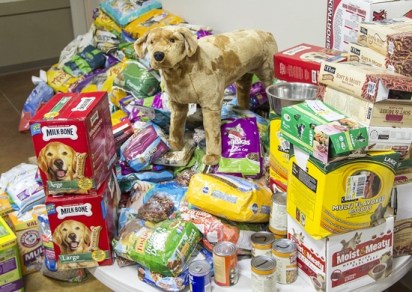
One of the easiest things you can do to help a local animal shelter or dog rescue is donate dog food, dog treats, and dog toys. Photo from BrightSide Animal Center.
1. Donate Dog Food & Dog Treats
The next time you buy dog food or dog treats for your dog, buy an extra package/container/can and store it in a box at your home. When the box is full, take it to a local shelter or rescue.
(Do NOT donate anything that has already been opened as most places won’t accept them.)
2. Donate Dog Toys and KONGS
Because these organizations have limited resources, buying toys is often low on their priority list. Their first priority is providing food, shelter, and medical care for their dogs,.
But dogs, especially those confined in shelters, need toys to prevent boredom and provide an outlet for their energy. And KONGS stuffed with food/treats can capture and hold their attention for long periods of time.
New toys and KONGs are ideal, but gently used items are OK. Just be sure to clean them thoroughly before you donate them. Don’t give them filthy toys that are falling apart!
3. Collect Used Tennis Balls
You don’t have to be a tennis player to do this. Tennis clubs and local tennis teams buy new balls constantly. Ask them to save their used tennis balls for you to donate.
Most will be happy to do it. And the dogs will be happy to chase them.
4. Donate Old Sheets, Rags, Towels, and Blankets
These are among the most used items for animal shelters.
Staff and volunteers use them to clean up messes, dry dogs after baths or rainy walks, provide comfortable bedding.
The heavy usage also wears them out quickly, so there is always a demand for them.
5. Help with Administrative Tasks
Many folks in the nonprofit world don’t have tons of experience with bookkeeping, balancing checkbooks, creating/maintaining data bases, and other administrative work.
If you do, you may have a valuable skill they need.
6. Take Pictures/Videos of Dogs for Adoption Listings
Groups have found that adoption rates improve when they post high quality, visually pleasing pictures or videos of dogs available for adoption.
The difference between seeing a picture of a happy dog playing and picture of a dog cowering sadly in a kennel can determine whether or not it finds a forever home.
If you can take/edit pictures or videos, these groups need your talents.
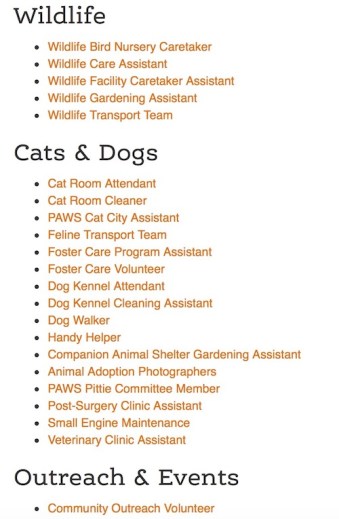
Many groups have a volunteer page on their websites that show the areas where they need volunteer. Image from PAWS.
7. Write Descriptions about Dogs Available for Adoption
An interesting, cleverly written description of a dog can also help its chances of getting adopted.
8. Work on Social Media
Social media evolved into an important tool for finding homes for adoptable dogs, but many groups don’t have time or money for their staff to design and oversee their social media pages like Facebook and Twitter.
Shelters and rescues also need help posting dogs available for adoption on adoption sites like Petfinder and Adopt-a-Pet.
If you have experience doing this you should be able to find a group that needs your help.
9. Volunteer at Events
I have yet to see a shelter or rescue that doesn’t hold at least one major fundraising event per year, and volunteers play a major role in organizing them. Here are just a few of the things you could do:
- Design/Distribute announcements about the event
- Send out media alerts to get the press to cover the event
- Find organizations to sponsor the event or donate food/prizes
- Put together participant packets
- Design & print programs
- Register people at the event
- Set up and tear down at the event

Most animal shelters or dog rescues have one or more big fundraising events per year that wouldn’t be possible without the help from dozens of volunteers. Image from Seattle Animal Shelter Foundation.
10. Foster a Dog
Fostering is one of the most important things volunteers do for animal shelters and rescue groups. Not only does it make room for a facility to take in more dogs, it also:
- Provides structure, socialization, and training for dogs that need it
- Reduces stress on dogs that need calm environments
- Gives extra care and attention to sick, injured, or special needs dogs
- Provides a home for puppies too young for adoption
- Allows senior dogs to live in a more comfortable, less stressful place
While fostering a dog takes more time and commitment than other tasks, it is also one of the most rewarding activities you can do because you’re helping a dog overcome challenges that could prevent it from ever finding a forever home.
Buddy faced some of these challenges at the Seattle Animal Shelter. He was anxious and shy in the shelter environment, so he was placed in a foster home.
Since then Buddy is much less anxious, and his goofy, fun-loving personality is beginning to emerge.
11. Walk Dogs
This is particularly important for dogs kept in confined environments. Exercising gives them a chance to burn off energy that could otherwise develop into behavioral problems and reduce the chance that someone will adopt them.
It also gives volunteers the opportunity to teach them basic commands (sit, stay, come). This can increase their chances of adoption as some people prefer dogs that are already trained.
12. Donate Poop Bags
Dogs poop, so rescues and shelters constantly need poop bags to pick it up during walks. You can either buy poop bags or collect plastic bags that hold things like newspaper and produce.
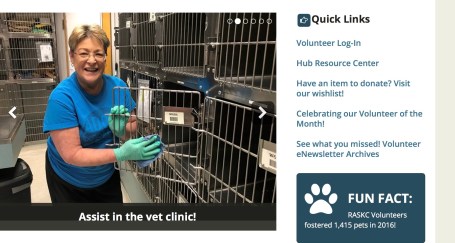
Behind every successful animal shelter and dog rescue are legions of volunteers that help keep the facilities running and provide extra care for the animals that need it. Photo from Regional Animal Services of King County.
Believe me, you’ll get many kudos when you drop off a load of poop bags to these organizations.
Now That You Know, Do Something!
I’ve been a dog walker for the Seattle Animal Shelter for about 5 years, and it’s one of the most rewarding volunteer jobs I’ve ever had.
Of course each rescue and shelter has its own particular needs so they either may not need help in all these areas or have other volunteer opportunities I didn’t list.
Check with individual shelters to find out where they need the most help. Some of them also post “wish lists” of stuff they need.
I’ve also seen firsthand how its volunteers help the Shelter provide quality care to its dogs and find forever homes for them.
Seeing how dedicated the Seattle Animal Shelter staff and take care of the animals there and finding homes for them is energizing and motivating. And knowing that I played a small part in the process incredibly fulfilling.
You should try it yourself sometime!
And if you can’t volunteer, you now know several other things you can do to help your local animal shelter or dog rescue.





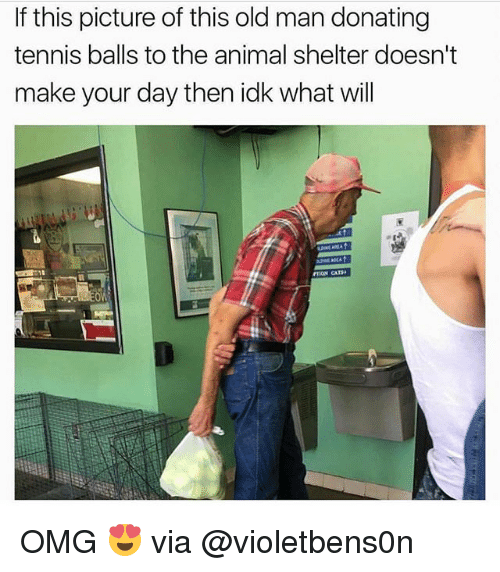
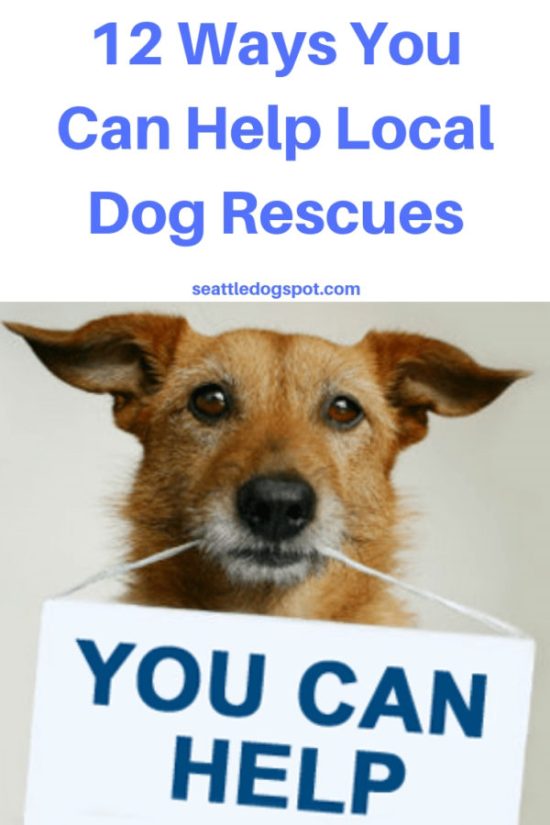
Great. Thank for sharing
Thanks!
My family recently adopted a Greyhound, Ziggy, and we have been inspired to find ways to help and support our local shelters. Wonderful article with insightful suggestions. Thanks!
Congrats!
I’m interested in volunteering but I’m not vaccinated. If I show a negative test does that work? I’m waiting for the Novavax vaccine. I’d like to photograph dogs! I’m an ward winning photographer. I also have items to donate and not sure where or when is the best time to donate items.
You’ll need to check with individual shelters to see if you have to be vaccinated or not. Thanks for wanted to volunteer!